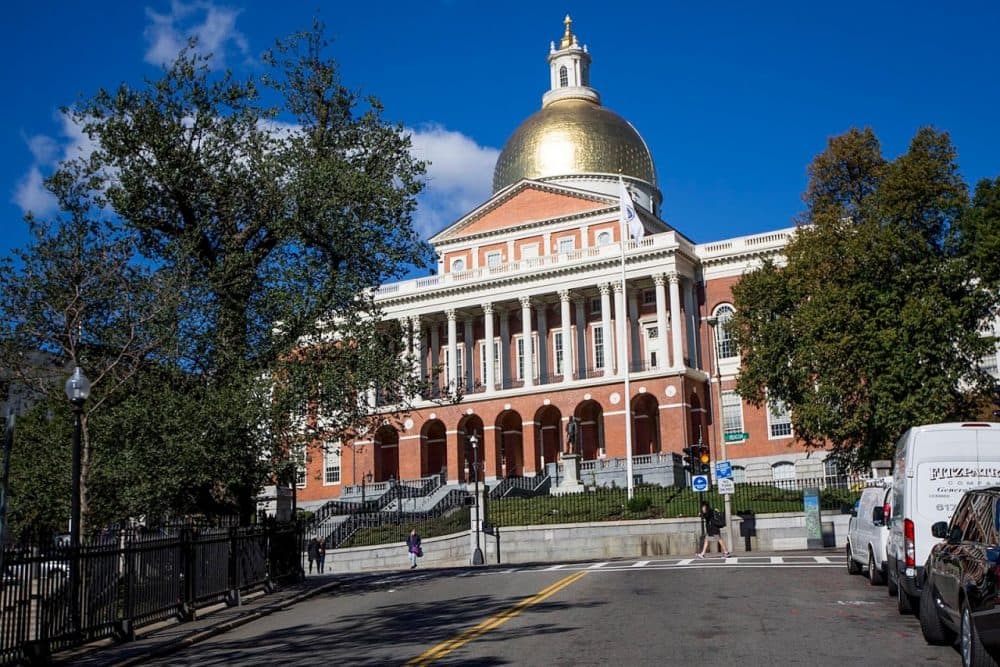Advertisement
Analysis
Sales Tax Ballot Question Could Make 2018 Elections More Interesting — And Puzzling

The political intrigue surrounding the 2018 elections grew this week. The Retailers Association of Massachusetts announced it is exploring a ballot campaign to cut the state’s sales tax.
If the measure makes it to the ballot alongside the so-called "millionaire's tax," which is already slated for the ballot, voters could be asked to make two major changes to state tax policy next fall. These changes would come alongside what is already likely to be a blockbuster election cycle, with the de facto heads of both parties in the state standing for reelection.
The particulars of the ballot measures hold the potential to scramble some conventional political alliances.
For years, education and transportation advocates have been eyeing the millionaire's tax as a way to raise state funds for education and transportation. The 4 percent surcharge on incomes over $1 million would raise an estimated $1.6 billion to $2.2 billion for state coffers.
But if the increase passes alongside a sales tax cut, the result could be the state collects the same amount of taxes (or possibly even less). The sales tax raises about $1 billion for each percentage point, so the net outcome of the changes would depend of the size of the sales tax cut, which the MRA has not specified.
The sales tax proposal puts Democrats in a bit of a bind. On the one hand, lowering a regressive tax like the sales tax (lower income people spend a larger share of their income buying consumer goods) while raising taxes on the wealthy would make the state’s tax code more progressive, a cause often favored by Democrats. But rebalancing the tax code is only a secondary goal of the campaign for the millionaire's tax. Instead, the leaders of the “Fair Share” campaign have focused on the need for new revenues to bolster education and transportation spending.
Democrats lining up against Gov. Charlie Baker will need to navigate this same conflict. And Sen. Elizabeth Warren, in her role as champion of progressive causes, will either need to steer clear of the issue, or find a way to balance the two competing priorities.
It’s early still, but it’s possible voters could support both measures.
The millionaire's tax proposal has been very popular in early polling, with 77 percent support in a January WBUR poll. The measure is by no means a lock. Massachusetts voters have a long history of voting down graduated income tax measures, and the partisan split on the issue would likely be wide.
Advertisement
The retailers association is claiming similar lofty support for lowering the sale tax in a pair of polls it discussed in a release this week. The question wording was not included, and they declined to provide it for this story, so we don’t know what was asked or how. That’s not unusual for a campaign press release, which is essentially what this was.
Though the details of the poll are sketchy, the retailers association insists the proposal behind the poll is a serious one.
“It has to be,” wrote MRA President Jon Hurst in an email. “We need consumers and public policy leaders to understand that the 6.25 percent [sales tax] government imposed anchor around the neck of local stores is drowning Main Street.”
The comments from Hurst suggest the retailers may see a political opportunity in linking the two ballot questions. “The possibility of a progressive tax reform package--one that actually helps lower taxes for low income families, and helps save small businesses on our Main Streets, is worth a close look as to its appeal to voters,” he wrote.
Noah Berger, of the Massachusetts Budget and Policy Center, says the uses of the sales tax and the proposed millionaire's tax are different, making it hard to link the two ballot questions. The millionaire's tax revenue is intended for education and transportation, meaning spending would have to be reduced in other areas to offset any cut to the sales tax.
"Simply cutting the sales tax and paying for that tax cut with over a billion dollars in budget cuts would be very problematic as it could lead to deep cuts in local aid, access to health care and other services people rely on," he wrote in an email.
A business group taking up the cause of progressive taxation with an inopportune tax cut may well give Democrats and progressive groups fits, particularly those already dreaming up ways to spend the new funds from the millionaire's tax.
Raise Up Massachusetts, the group pushing the income tax amendment, declined to comment.
Baker has supported past efforts to cut the sales and gas taxes, but has so far sidestepped questions on whether he would support a sales tax cut.
“That one has a long way to go before it ends up coming before the voters and if it does, obviously, we'll talk about it then," Baker told reporters this week. "But I did support back in 2010 the idea of reducing the sales tax from 6.2 to 5 and there's no question that retailers in Massachusetts face tremendous competition and pressure from our colleagues north of the border who don't have a sales tax at all.”
The retailers describe their plight in similar terms: “Our Main Streets and major shopping districts are in jeopardy, and it appears many pols either don't understand that or don't care.”
Asked about the millionaire's tax, a Baker spokesperson was also noncommittal in an email.
“Governor Baker does not support tax increases on our hardworking families, and was pleased to sign a balanced budget last year that reflects the administration's priorities to create better communities, schools and jobs with no new taxes,” the aide wrote.
It’s not hard to envision a scenario in which voters give themselves a tax break while asking millionaires to foot the bill. If they do, the two big unknowns are the impacts on state coffers and on the 2018 electoral calculus.
Consumers and sellers may enjoy cheaper goods, but state government, which is struggling to balance its books now despite strong economic growth and low unemployment, could be left holding the bag. How political candidates approach these issues could tell us a lot about how the 2018 campaign will unfold.
This article was originally published on March 30, 2017.
